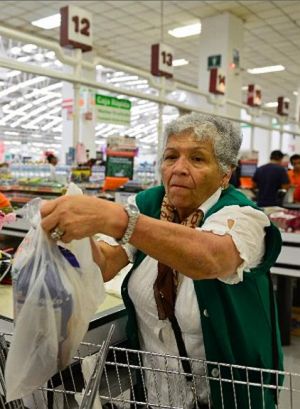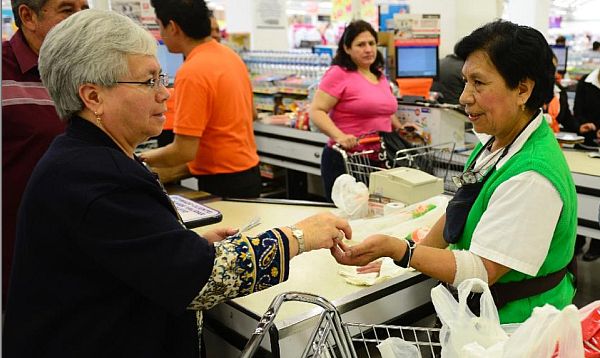Mexico City - Prudencio Diaz, a 66-year-old retiree, stuffs groceries into bags at a Mexico City supermarket, working as a "volunteer" for tips to complement his miserly pension.
Diaz is among 22,000 seniors who toil at the end of checkout lanes across Mexico, wearing aprons and hoping generous customers will hand them a few pesos for their efforts. The retired mechanic gets the minimum pension of 1,200 pesos ($80) per month, a bit more than half the minimum wage.
"My pension is not enough. I have no problem being a volunteer packer," the former boxer said with a smile, exposing some missing teeth.
Only a quarter of the 11 million senior citizens in Mexico - Latin America's second-biggest economy - receive a pension.
Many do not get any retirement benefits in their less than golden years because they worked in the informal sector all their lives, or did not contribute long enough to the pension system.
After spending his childhood raising cattle in Zacapoaxtla, a town in central Puebla state, Diaz moved to Mexico City when he was 15 years old.
Once in the mega-capital of 20 million people, he held a series of informal jobs, from carrying water bottles to truck driver and bartender at a high-end restaurant, where he made pina coladas and other cocktails.
A fan of sports, he was paid $10 per fight as a boxer. Losing his arm in an accident while working as a mechanic at the age of 25 did not stop his passion for sports - he has run 35 marathons over the years.
Today, to make ends meet, he also sells tamales, or cornmeal dough, outside the supermarket, makes sandwiches for parties, trains young marathon runners and acts in commercials. Despite all these jobs, "it's not enough to live," said Diaz.
Lucrative Tips
 |
"We need to open spaces for them, or they'll do it themselves, working as street sellers, taking risks in activities in which they could have an accident. This program is better, it's more controlled," said Barbara Bernes, deputy director of the government's senior citizens affairs department, which promotes the volunteer work at supermarkets.
"It isn't the policy we love the most, but, as the song goes, that's what's on offer."
Some 800 Mexicans turn 60 every day and have no more than primary education on average, limiting their options for formal work, so many are willing to work for tips bagging groceries. And by not getting salary, they can still receive their pension checks.
With only 10 percent of seniors saying they have technological training, "many can't compete with today's labor market demands," said Mayra Membrillo, a department head at the senior citizens affairs department.
Labor Discrimination
Wearing pearl earrings and her silver hair tied with an elegant scarf, 62-year-old Maricela waited outside a supermarket for her shift to begin.
The former saleswoman regrets being unable to land a job as a phone operator.
"They told me that they noted my ease with words, my preparation and friendliness, but they didn't take me due to my age. That's discrimination," she said.
This exclusion of older Mexicans from the workforce contrasts with the privileged place they had in pre-Hispanic Mexican society.
"They were in charge of keeping the traditions and the wisdom of the people alive. The fact that they were so close to death gave them a certain sacred place," said Patrick Johansson, history researcher at the National Autonomous University of Mexico.
After putting meat, fruits and vegetables into bags for five hours, Diaz counted his coins one by one.
"I tell young people to do their best because, as the saying goes, 'as you see yourself, I saw myself; and as you see myself, you will see yourself'," he said with his usual smile.
Original article


